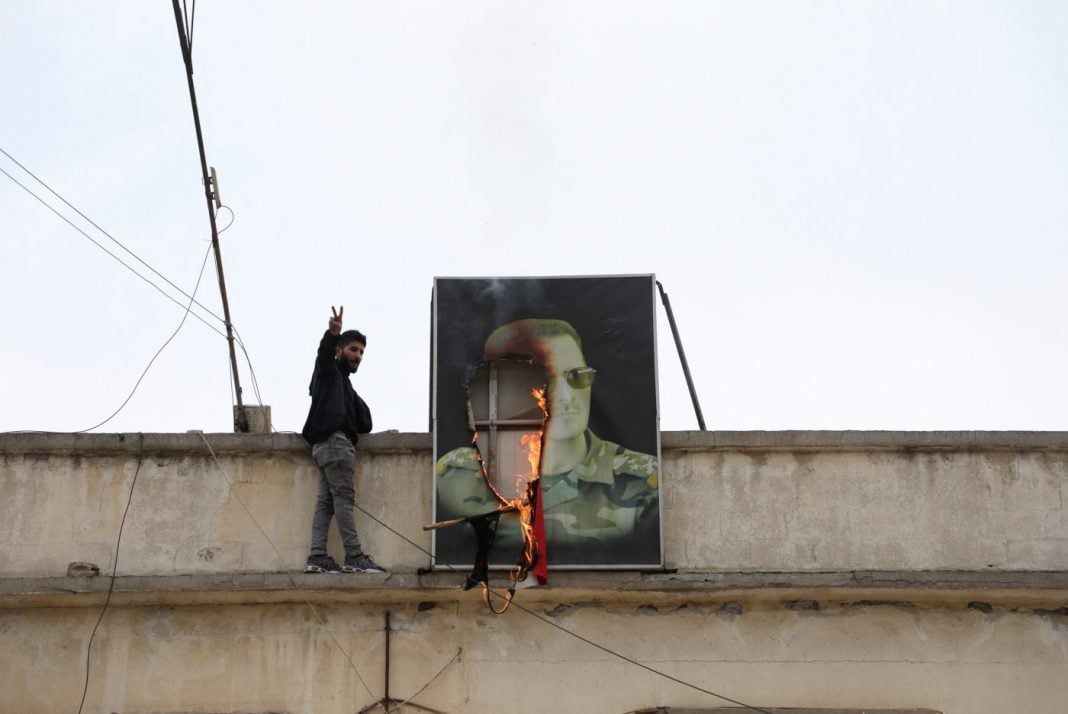Russia’s premier propagandists — tightly controlled, slavishly loyal, and richly rewarded media talking heads — roundly rejoiced Donald Trump won the US election. Things were going their way.
Their glee was only amplified by the arrival in December of the US TV celebrity Tucker Carlson to interview Foreign Minister Sergey Lavrov. On December 6, appearing on the state TV program Time Will Tell, State Duma member Andrey Isaev described the sit-down with Tucker as a useful opportunity for Lavrov to feed propaganda directly into American homes.
“Sergey Viktorovich [Lavrov] made a very important move. Here, he acted in the capacity of a man who is propagandizing to American audiences, explaining things to them,” Isaev said,
Their joy was short-lived. The sudden downfall of the murderous Assad regime in Syria, Russia’s primary Middle Eastern ally, shocked the Kremlin’s mouthpieces. Decorated propagandist Vladimir Solovyov was forced to admit on-air that Russia was unable to come to Assad’s defense because it is currently “busy” in Ukraine.
Nor was Trump, who many propagandists have assumed to be a fellow traveler, indicating he shared Russia’s outlook. The President-elect seemed happy that the Syrian leader was gone, stating on his Truth Social network that Assad: “Has fled his country. His protector, Russia, Russia, Russia, led by Vladimir Putin, was not interested in protecting him any longer. There was no reason for Russia to be there in the first place. They lost all interest in Syria because of Ukraine, where close to 600,000 Russian soldiers lay wounded or dead, in a war that should never have started, and could go on forever.”
Trump also noted that President Volodymyr Zelenskyy and Ukraine “would like to make a deal and stop the madness.”
While this may indicate a number of things about the president-elect’s opinions, it could hardly be taken as Russophilic. It also suggested that any idea of an easy peace settlement for Ukraine was far from realistic. And indeed Russian government officials constantly reiterate that the Kremlin will not commence negotiations unless Ukraine retreats from Russia’s “new regions” first — meaning it should surrender land that Moscow has been unable to take by force.
If peace proves elusive in Ukraine, its arrival in Syria through the defeat of a longtime Kremlin ally, has caused lamentation in Russia.
Of course, according to Putin’s pet propagandists, the outcome was in no way Putin’s fault and the mouthpieces were keen to direct the blame elsewhere. Was ex-President Assad able to watch the sudden switch in Kremlin storylines as he settled into his new guest dacha? Did the family gather around him, like any Russian family, to watch Russia’s propagandist-in-chief artfully explain the unfolding disaster by blaming Assad and his corrupt regime for the fiasco? Did they note the change of wording as Russia’s newscasters turned terrorists into rebels and finally blandly transformed them into an opposition movement?
Solovyov delivered some of his trademark moans and grimaces, as he salted the bitter truth with a thick sprinkling of lies: “For us, Syria is a very sensitive issue,” he said. “Before our very eyes, Syria that we have known has ceased to exist. That’s obvious.”
He went on to blame the Syrians for the fall of the Assad regime. Solovyov asserted: “If the people don’t want to fight for their country, no external force can help them — regardless of the numbers. If the people want freedom, if they want to fight, then they can be supported.”
Solovyov blamed Assad’s allies — aside from Russia — for not showing up to defend his rule. He said: “The Iranians did not show up. The Iraqis did not show up. The Lebanese did not show up. They did not come to help.”
Other pundits took turns bashing Bashar and his corrupt military, repeatedly reiterating that Russia is not to blame for Assad’s downfall, although one country that chose to run away rather than fight was Russia itself.
What of the future, that happy dawn that recently seemed so bright? Solovyov sounded none-too-hopeful about the US President-elect. “Trump’s Tweets were extremely unfriendly towards us and demonstrate that we should not harbor any illusions. We shouldn’t look for a friend in him. He says, this [Ukraine] war should stop, and everyone should go back to their own corner. I have a little question: what makes him think that his opinion is so important to us?”
But while the Russian TV host does not trust Trump’s intentions, he does believe he’s the catspaw of the man in the Kremlin. The incoming American president doesn’t have a peace plan to set forth, Solovyov says, because he is waiting for Putin to tell him what it is. Experts on state television predicted that the terms of the deal will benefit Russia and cause problems for Ukraine.
The Head of RT Margarita Simonyan sought to brighten the mood by cheerily mentioning that Tulsi Gabbard, Trump’s nominee to serve as Director of National Intelligence, was reportedly watching and widely sharing RT’s reports and videos.
She predicted: “Unquestionably, victory will be ours. Unquestionably, this chaotic world, permeated with the stench of the corpse of dead democracy, has nothing to do with us. We will be building what we need, at the speed that suits us — and our goal is to help our president in doing so.”
By Julia Davis, for CEPA
Julia Davis is a columnist for The Daily Beast and the creator of the Russian Media Monitor. She is a member of the Academy of Television Arts and Sciences, the Screen Actors Guild, and Women In Film.
Europe’s Edge is CEPA’s online journal covering critical topics on the foreign policy docket across Europe and North America. All opinions are those of the author and do not necessarily represent the position or views of the institutions they represent or the Center for European Policy Analysis.





